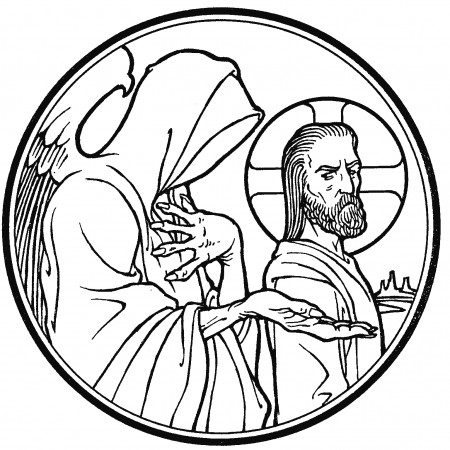The First Sunday in Lent
Matthew 4:1–11
+ IN NOMINE IESU +
Lent is a journey with Christ to the Cross and the Empty Tomb. In Holy Baptism, we have been united with Christ, and so our journey is not just with Him but in Him. We follow Him where He leads us. Christ is leading us home to God our Father in heaven. We’re on a journey toward heaven. And when you travel, there are some things you need to leave at home. You need to travel lighter. By repentance, we leave our sins behind us, and one of those that easily takes its hold in this world is complacency. Let’s leave complacency behind.
One reason for complacency is that we are masters of compartmentalization. We can create little boxes where each thing fits quite nicely in our life. This is where we do the God-thing on Sunday mornings; maybe even give up chocolate or something for Lent, and for the rest of the time, we just go with the flow. Cohabitation, pre-marital intimacy, office flirtation, or looking at obscene pictures; willfully ignoring public sin by holding your tongue, holding grudges, or not letting the past stay in the past; letting other activities take precedent over prayer and meditation on God’s Word, giving an unfaithful witness to others by being absent from or inattentive in the Divine Service, or looking at the life of others and becoming bitter or dissatisfied with the life that God has actually given: These things are not difficult to do when you compartmentalize.
The problem is—and when I say problem, I mean big-time, eternal problem—the problem is that compartmentalizing, relegating God to this Sunday box, is sure to result in complacency, or what the Church has called acedia, spiritual sloth. And complacency jeopardizes your salvation. “It is that sin that gives its heart to nothing, cares for nothing, seeks to know nothing, interferes with nothing, enjoys nothing, loves nothing, hates nothing, finds purpose in nothing, lives for nothing, and remains alive only because there is nothing it would die for” (Dorothy Sayers, “The Other Six Deadly Sins,” in Letters to a Diminished Church, 97). It hides in a flurry of activity that keeps it from truly investing in and investigating the things of God.
The opposite of complacency is internal conflict. Our Father in heaven is calling us home, and our brother Jesus Christ the crucified is leading us there on His way. And, in a strange way, an unwelcome way, God’s call home causes us internal conflict, and if it doesn’t, that is a sure sign that complacency has taken root. Because the internal conflict we struggle with, or at least should struggle with, is the conflict between our natural desires and the clear Word of God revealed to us in His Son and recorded for us Holy Scripture.
“Did God actually say, “You shall not eat of any tree in the garden?’” the serpent said to Eve. By asking the question this way, the serpent implies that God is withholding blessings from Adam and Eve. It is this implication that he will capitalize on later. But the statement is so crass, that Eve is drawn to correct his blatant lie, which she does, but she fails to correct his implication. In other words, if she’s going to have this conversation at all, which Adam should have done instead of Eve, she must also counter the serpent’s underlying implication that God has withheld any blessing from them. Since she doesn’t, Eve is wide open for the serpent’s argument, “You will not surely die. For God knows that when you eat of it, your eyes will be opened, and you will be like God . . . .” It is this statement that deceives Eve. She accepted without countering the implication that God was holding out on them. And if eating this fruit will make them like God, then of course it is good for food and it will make them wise.
Once we accept the underlying and unstated proposition that God is holding out on us, the devil can lead us to rationalize any kind of behavior our unholy desires want. Rationalize, compartmentalize, and follow your heart. “Surely you won’t die . . . You’ll be like God.” Surely you won’t suffer the consequences. Surely you’re different. You can beat the statistics. For you are master of your own future, the maker of your own destiny. You’ll be like God.
And even if you don’t see the conflict between your heart and God, be sure that God does. “The Lord saw that the wickedness of man was great in the earth, and that every intention of the thoughts of his heart was only evil continually” (Gen 6:5). “The mind that is set of the flesh is hostile to God, for it does not submit to God’s law” (Rom 8:7).
Enter our Lord: “If you are the Son of God, then . . . prove it.” The Lord doesn’t prove it by entertaining the serpent’s suggestions. He doesn’t reason with the devil. He simply states what His Father has already stated. And He sees through the implication that God the Father is holding out on Him. He proves that He who He is by being the Son of God the Father, being about His Father’s business, living not on bread alone but by every word that proceeds from His Father’s mouth and heeding it. He does it by submitting to His Father’s will because His Father’s will is always good. He does it by yielding to His Father’s Word because the Father does not lie. The Father is not withholding any blessings, He is giving them in His time according to His Word and the good of His creation.
Jesus doesn’t take away the internal struggle of living as a Christian in this world. He doesn’t baptize complacency. He was not tempted, He did not suffer and die to justify sin, but sinners, sinners who repent, who leave their complacency behind, and trust in Jesus for salvation from their sin. Indeed, baptism doesn’t make it go away. It does just the opposite. It intensifies this struggle. It brings it to the fore. For just as the Holy Spirit, who descended upon Him at His baptism in the Jordan by John, led our Lord into the wilderness to do battle against Satan, so does the Holy Spirit given to us in baptism leads us into an eternal battle. It marks us for temptation by the devil and the world. The sign of the cross upon your forehead and heart marks us for the attacks of the Satan. For the devil does not need to focus on the pagans. He already has them. But he doesn’t have you. Because you belong to God.
And complacency, the compartmentalization of holy and divine things, is the devil’s friend in getting you back, in pulling you away from your Father in heaven who is calling you home. It is how he lulls us to sleep so that we do not pay attention, do not follow God and His Word, and try to make our own way despite what His Word says. Complacency is giving in to the proposition that God is withholding His blessings from you. The Holy Spirit that led Jesus in the wilderness to be tempted is the same Spirit that was given to us. He does not lead us into temptation, but Satan knows all whom he does not have.
When Jesus was baptized, he demonstrated His identity and solidarity with us sinners. Though Jesus had no sin, though He has no need for the forgiveness of sins, He submitted to John’s baptism to fulfill all righteousness, to demonstrate that He is with us, fighting in our corner. And when our Lord came up out of the water, a voice came from heaven, saying, “You are my beloved Son; with You I am well pleased.” And then the Spirit drove Jesus into the wilderness to be tempted. That’s the conflict. And our Lord never wavered in His total commitment to His Father, but He did know and experience the very real struggle against the devil and all the forces of evil.
Unlike Jesus, we have this evil in our hearts, but like Jesus, because of the Spirit given to us in Holy Baptism, we struggle against it. This struggle is real, just as it was real for Jesus. St. Paul wrote about this struggle in this way, “I do not do what I want, but I do the very thing I hate” (Rom 7:15). And again elsewhere, he wrote, “Work out your own salvation with fear and trembling” (Phil 2:12). We struggle against the temptations of the devil, the ways of the world, and our own sinful hearts. We wrestle against our sinful desires and the things that seek to pull us away from attaining the outcome of our faith, the salvation of our souls.
But we don’t do it alone. For we have been baptized into Christ. We have put on Christ. And we wage war against the forces of darkness in the world and within us with Him and the help of the Holy Spirit. And the Holy Spirit continues to help us through the Word of God, as Christ says, “My Word is Spirit and it is life” (John 6:63). This is what it means to truly live. Our lives as Christians, as those redeemed by the precious blood of Christ, are lived in the Word of God. It is defined, clarified, and described by the Word of God. We follow Christ, not only in the struggle itself but also in the how of the struggle: by reliance upon and trust in the will and Word of the Father. And just as it went for our Lord, so it goes for you. The devil leaves and the holy angels come and minister unto you “ . . . therefore with angels and archangels and all the company of heaven . . .”
“Though devils all the world should fill, all eager to devour us, we tremble not, we fear no ill; They shall not overpower us. This world’s prince may still scowl fierce as he will, he can harm us none. He’s judged the deed is done; one little word can fell him” (LSB 656). That deed is the death, resurrection, and ascension of our Lord Jesus Christ, which you have been included in by Holy Baptism. And that “one little word” is liar. The devil is a liar. God is not holding out on you. If God the Father did not spare His own Son for you, how will he not give you all things? He will and He is. Get behind me, Satan, for you are a liar, and I’m leaving you and the complacency you bring behind. Amen.



0 Comments